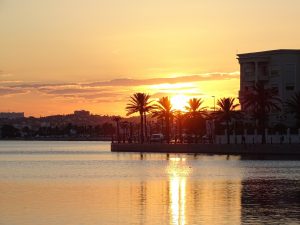The subway is something I do not go on a lot anymore, said the boy. On the subway, said the boy, people still gave me the evil eye; probably the long hair. Last time, a friend phoned; I spoke to him in Arabic. Soon after, a group of young men came up.
One said, “Are you Tunisian?”
“Yes,” I said.
Then, one of them saw the cross.
“Are you a Muslim?” he said.
“The cross is a gift,” I said. Then I told them the truth. “I am atheist,” I said.
I tried to ignore them, but one of them grabbed me by the shoulder.
“Oh really?” he said. “Then where do you think you are going after your death? Who created the universe if it was not Allah? If you do not revere Allah, you must revere Satan.”
Their clothes were torn and they were covered with dirt; they seemed to come from poor neighborhoods.
“You should be stoned to death,” one of them said. “I hope your body will burn to ashes in hell. You are nothing but a slave of the Devil!”
They pulled out knives and blades and broken bottles. They kept pushing, hitting, punching me.
They said, “Look at this guy: he hates Allah and loves Satan. Let’s f*** his mother.”
One old lady looked away and said: “Poor kid”.
A couple of teenagers laughed. Others passengers looked away and did not do anything.
But, for me, inaction is complicity. They sliced me up pretty good, I guess. I ended up in the emergency room.
My father, said the boy, was a pious person. He forced me to learn the Quran by heart. If I got something wrong, he slapped or hit me, locked me in my room. I was young, but understood the meaning of the verses. I found the اقتلوهم (Kill them) in the Quran terrifying and the fate of women not fair. After a while, I did not even want to learn religion, but was afraid of my father. It is not just Islam, I do not like the other two religions, either. “Religion” for me now just means “violence” and “kill.” Sometimes I worry if Tunisia’s future seems heading straight towards intolerance and, worse, extremism.
The thing that struck me most is that they had no beards. Terrorism seems to be changing tactics. It no longer shows up as beards, revolvers, religious clothing… But it has started to take over our daily lives: in buses, subways, streets, supermarkets, maybe mostly in the slums. Every day, there, terrorists are being snapped up by ISIS.
The thing is, Muslims generally do not have great arguments, so they just insult us. The subject of religion seems taboo for them: seeing other people — especially those who do not share their same beliefs — criticizing or asking questions about it is considered a humiliation. Discussing Islam means questioning its credibility, and so humiliating it. Tunisians, in fact, do not seem to like religious diversity. For them, the presence of other faiths and religions represents a threat to the survival of their Arab Muslim identity, already tarnished by terrorism, such as ISIS, and the media. In fact, they fight like crazy to preserve this identity because it makes them feel superior to other nations, especially Westerners because of their “advancement” and “progress.”
Discussing Islam also seems a threat to their psychological safety: having the same beliefs and the same God is a sort of a reassurance and protection. To cast doubt on their religion means breaking into their “comfort zone” — and possibly even raising doubts. That might explain their aggressiveness towards others who do not share their religious beliefs. Religious diversity also might cause fear of the unknown: they have been indoctrinated since they were so young, their minds have become inflexible, rigid.
For many, religious tolerance has become a business currency — a way to promote tourism, improve relations with other countries, elevate Tunisia’s image and benefit from the aid of rich countries. But that only makes tolerance a mask worn for personal gain. Sadly, it is just an accessory, used to fit into the modern world and to keep pace with a wooden language lexicon: words such as “civilization” and “human rights.”

Tunis, Tunisia. (Image source: Pixabay) |
In Tunisia, Politicians try to promote tourism from Western countries by claiming that Tunisia is a tolerant country. But when an internet café puts up a sign saying, “Forbidden for atheists and homosexuals,” they do not react. They probably do not go on a lot on the subway anymore, either.
Tharwa Boulifi, aged 15, lives in Tunisia.
























